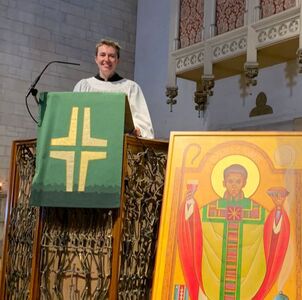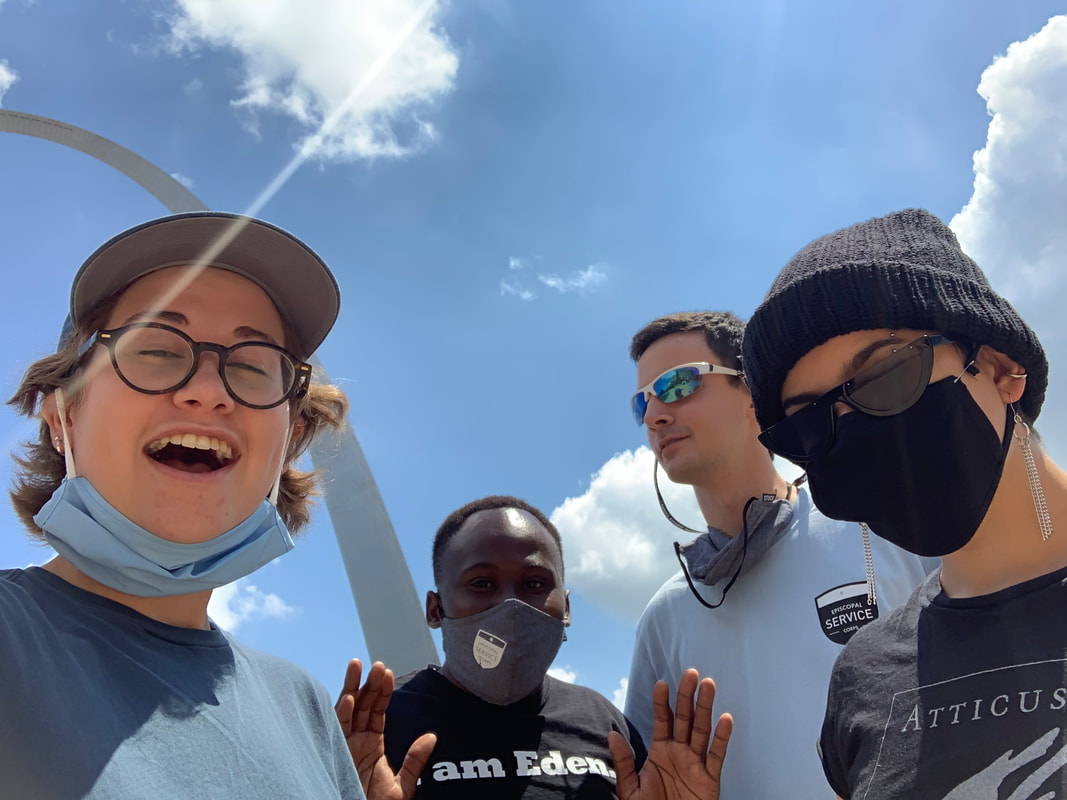 Sermon by Corps Member Megan Oakes on Luke 8:26-39 for Proper 7, the Second Sunday after Pentecost, on June 19th, 2022 at Christ Church Cathedral in St. Louis, MO. Demons are real. Maybe they aren’t like, scary ghosts that swoop around, with horns and stuff. I don’t really think that they’re lurking in the corner, out to get us if we listen to the wrong type of music, watch the wrong type of TV, read the wrong books. But they’re real, and they’re out there.
The man in today’s gospel was possessed with demons. They drove him out into the wilderness, they caused him to suffer, they caused him unimaginable pain. And. The gospel says that “he was kept under guard and bound with chains and shackles.” It says that he wore no clothes, and had not for a long time. It says that he lived among the tombs - among the dead, pushed out of his own community because of his suffering, because of his uncleanness. Made more and more ritually unclean on account of his anguish. Perhaps this man, who was filled with a legion of demons, wasn’t the only one in his community suffering from demonic possession. His demons might have been louder, might have been more disruptive, more gross. They might have been the kind that scares the nice people a little more, the people who don’t want to hear swearing and shouting and feel themselves dirtied by the other. But what sort of force causes someone to chain a person, a living human being? To try to keep them under control, to hold them still, to ~protect the community.~ What sort of entity would cause a community to run someone out, leaving them to sleep outside, without clothing, among the dead? We could, certainly, call that a demonic force. But there’s something scary about naming this as demonic, pushing the definition out past the naked man, past the one we’d call weird. Because when we name the “nice” behavior as demonic, the behavior that keeps our communities as they “should” be, it forces us to call ourselves possessed. It forces us to see that we ourselves, and those we love, and those we worship with, are poisoned by the forces of the devil. Bills that ban camping in public places, effectively criminalizing homelessness, aren’t passed, pushed for, or supported by people who look “scary,” who “look” like they might have a demon in them. They’re passed by our neighbors, our friends. They’re passed by the people that society tells us are nice, are good, are doing everything right. They’re passed by us. Today we’re celebrating Juneteenth, a holiday celebrating the announcement to enslaved Black people in Texas that the civil war was over and that slavery was abolished. This was over two and a half years after the Emancipation Proclamation had been issued. It’s a celebration of freedom, of overcoming oppression. And. It’s a reminder of the quietness of evil, of the subtlety of demons. The same forces of silent evil, of not telling people of their freedom because it would mean relinquishing control, giving up sin. Continuing to exploit the lives and labor of thousands of people for personal gain, and still being able to re enter society after it with no repentance or change, because this sin wasn’t running naked or looking scary, it was insidious evil, committed by those who white society deemed, and continues to deem, the good guys. The demons are sneaky, and so obvious if you’re looking for them, if you’re the one suffering the consequences. So what about now? Where are our subtle, societal, horrific demons now? We don’t have to look any farther than the nearest city jail to find out. Chaining those up who somebody, some force, has said are bad, even when the crimes committed are things those with more privilege get away with every day, is evidence of the persistence of this demonic force. We might like to think our world now is more moral than the one Jesus lived in, or than America in 1866. We might like to think that we’ve progressed, that we’ve learned more, become more humane, become more ~Christian~. But even though we might have more distance from it, every day our government enacts the same brutality upon the most marginalized in our communities that this man’s community enacted on him. Our society now is riddled with the same subtle, polite, demonic possession that this man’s community was. Jesus doesn’t join in this sin, this isolation, this ostracization. He doesn’t pass the suffering man by, doesn’t ignore or shun the man who suffers from more annoying demons, more scary ones. He doesn’t allow himself to be possessed by the demons that are all around in the community. He goes to the man, and tells the unclean spirit to come out. There is already life among the tombs. This man is already out there. There is already life among the tombs, because there is already someone that God cares for among the tombs. And Jesus, in his love for the man, in his particular love for the one sheep who has gone afield over the 99, goes out to be with him, to heal him, and to free him. God shows to this man the same love that God has shown throughout time, the same love that God proclaims in our reading from Isaiah today, love that reaches to those who are among the tombs. God is among the graves with the suffering man. God is no less with this man when he thinks that he is alone, only surrounded by the dead, than God is when interacting with him, loving him, face to face. God was with him the whole time. And then God comes to him physically, and sends the demons out from him, where they proceed to destroy themselves. He is freed, and his neighbors, his friends, his community who sent him into the hills, sees it. They see the man, “clothed and in his right mind,” sitting at Jesus’s feet. And they are so afraid. Why? Weren’t they afraid when he was full of demons, and if that was the reason, shouldn’t they be comforted now? I think that they feared their own sin. The same demons that begged Jesus not to send them into the abyss, the same demons that did not want to let go, do not want to come out of the people who punished this man, who feared him. They are afraid of the change that will take place - afraid of what it means for the demons that shape the structure of their society - of our society - to go away. Afraid of the unknown. Afraid of the question of what a world free from the powers of sin and death, of punishment and imprisonment, of DEMONIZATION would look like. And then, Jesus gets into a boat and leaves - but not without hope. Not without a continued reaching out, continued story, through the man who he had healed. After the healing is complete, after the man is himself again, after he is freed from what tormented him - Jesus sends him back. He makes him an evangelist of his mission. He trusts him with proclaiming his own story, proclaiming what God has done for him. God makes this man, the one deemed unreliable, unclean, the one who is set out to proclaim his story. He makes this broken stone the chief cornerstone in ministering to this community, in sharing the good news. There are demons, and they are real, and we can see them. And Jesus is continually reaching out, freeing people from them, offering to free us from them too, if we’re not too afraid. If we don’t send him away, scared of the disruption that his liberation offers, scared of seeing our own sin, our own society’s sin, face to face. Jesus is always there, offering this healing, offering to let our demons throw themselves off of a cliff, offering us a way back from the tombs, from our worship of death and sin. There is always a way back, if we’re brave enough to look at it. Amen.
2 Comments
|
Categories |
|
Mailing address:
DAH c/o Diocese of Missouri 1210 Locust St. Louis, MO 63103 |
(c) 2014 - 2020 Episcopal Diocese of Missouri
|


 RSS Feed
RSS Feed